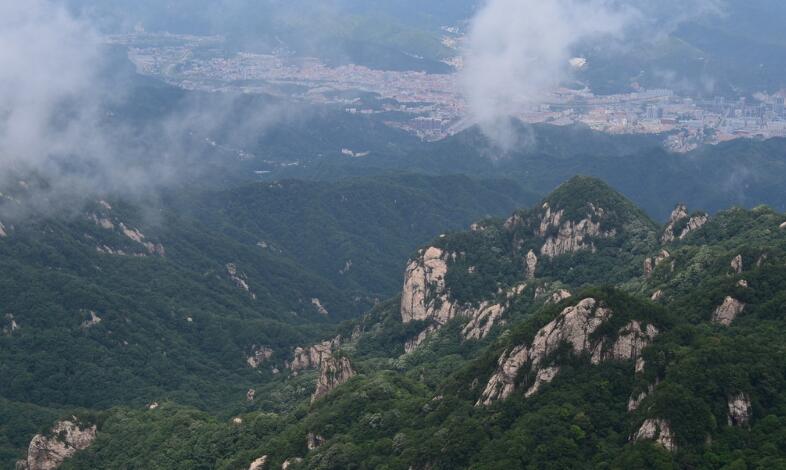As lessons about animals, love of the Earth, and English language were being taught in a room filled with 30 Chinese third-fifth graders, a little girl in a pink dress popped her head into the classroom, wide-eyed and shy. She was a beautiful six-year old native Laojun Mountain girl and yearned to join the summer camp although she was not part of the program. An exception was made and she was included in the program, outdoor games, and nature walks as die goal of conservation education is to inspire future generations to cherish and protect the environment. An unforgettable human connection was made, regardless of language barriers, between a few Americans and a compassionate six-year old girl.
We, Kirsten Nelson and Irina Rasner, served as interns at the Chengdu Research Base of Giant Panda Breeding from July 1 to August 9, 2013. As graduate students from the Graduate School of Social Work at the University of Denver in Colorado, USA, we worked under Dr. Sarah Bexell, Director of Conservation Education at the Chengdu Panda Base. Alongside Sarah and other panda base staff, our fellow peer and colleague, Ethan Crawford, joined us. Throughout our time in China, he filmed a documentary based on our work. The focus of this internship was on conservation education in rural areas of Sichuan province, while working in collaboration with other Chinese university students. The internship’s goal was to understand the main issues threatening giant pandas and red pandas, as well as other wildlife in Sichuan.
We felt an enormous honor being two students who earned this internship that focused on educating children to conserve the Earth and all its creatures. We felt trusted by the faculty at the University of Denver to represent our university and to become more knowledgeable in the topics of biodiversity and conservation education. While we spent time in two rural parts of China, we played games aimed at teaching children the importance of ecosystems. We also aided in doing research on human behavior in both the Chengdu Zoo and the Chengdu Panda Base. Our days were filled with raw, non-filtered scents and sights, including seeing beautiful, Asiatic black bears playing at the Moon Bear Rescue Center after having been tortured for the extraction of their bile. We would never have had the opportunity to travel and learn had it not been for the Graduate School of Social Work’s desire to broaden its lens and support students and professors to bridge together theory and practice.
One of our most memorable experiences took place in Laojun Mountain, at the summer camp’s concluding student performance. A group of elderly women, the grandmothers of some of the children, held our hands and said, “You are the first foreigners we have ever met”. This was not stated in a tongue native to us, and yet their words spoke more dearly than if they had been stated in English. The grandmothers invited us to hike with them to the tallest standing Buddha in the world the next morning. Greeting us with freshly boiled potatoes at 7:00am (after we had already eaten at least one bowl of noodles for breakfast), these unbelievable women hiked without a break to this extremely sacred place while unveiling a whole new world to us.
Prior to spending two months in Chengdu, we knew that expecting a Western toilet would be unrealistic, expecting a bowl of noodles to be spicy was a guarantee, and looking extremely different than the majority of people around us would be normal. Having these things told to us, however, was significantly different from living them. The sights, smells and tastes of food never lost its uniqueness, every bowl of noodles was amazing, and every Coca-Cola drink was that much colder than the summer humidity. Our Chinese friends gave us the endearing Mandarin names of “Ma-Ma” and “Hu-Hu”, and these words made us laugh because we could never pronounce them correctly.
After returning home to Denver, Colorado, we felt more aware of how people live, what we are taught to be important as Americans, versus what really is important. We hope that the two months we spent in China will continue inspiring each of us to practice mindful living, as well as enable us to share the stories we lived and heard. We would like to continue being advocates for the issues we learned about in China,as well as our own local conservation obstacles, this will influence our social work practice for the rest of our lives. Our experiences could never be replicated, and we are forever thankful to Sarah, Ethan “Yi-fen”, and the conservation education team at the Chengdu Panda Base. Our memories would be empty without the fantastic group of Chinese-university students, including Wang Lyudiao “Alex”, Lin ‘Amy”, Meng Xiangtao “Jeremy”, Ma Ii “Mary”, Yuqi, and Hairi “Harry”. You are all with us regardless of how much land and water separates our countries. Thank you for your warmth, hospitality, translation skills, hot-pot meals, laughter, games, and overall happiness you brought to our lives.












